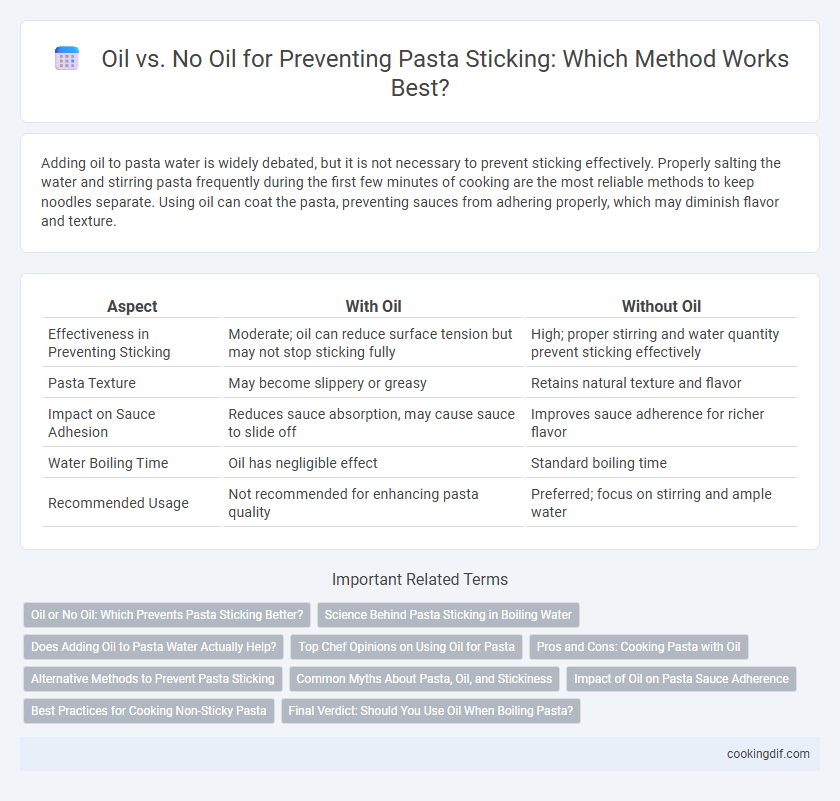Adding oil to pasta water is widely debated, but it is not necessary to prevent sticking effectively. Properly salting the water and stirring pasta frequently during the first few minutes of cooking are the most reliable methods to keep noodles separate. Using oil can coat the pasta, preventing sauces from adhering properly, which may diminish flavor and texture.
Table of Comparison
| Aspect | With Oil | Without Oil |
|---|---|---|
| Effectiveness in Preventing Sticking | Moderate; oil can reduce surface tension but may not stop sticking fully | High; proper stirring and water quantity prevent sticking effectively |
| Pasta Texture | May become slippery or greasy | Retains natural texture and flavor |
| Impact on Sauce Adhesion | Reduces sauce absorption, may cause sauce to slide off | Improves sauce adherence for richer flavor |
| Water Boiling Time | Oil has negligible effect | Standard boiling time |
| Recommended Usage | Not recommended for enhancing pasta quality | Preferred; focus on stirring and ample water |
Oil or No Oil: Which Prevents Pasta Sticking Better?
Adding oil to pasta water is a common practice, but it does not effectively prevent sticking; instead, it creates a slippery surface that hinders sauce adhesion. Stirring the pasta frequently during the first few minutes of cooking and using plenty of boiling water are proven methods to reduce sticking. For optimal texture and flavor, skip the oil and rely on proper cooking techniques rather than oil additives.
Science Behind Pasta Sticking in Boiling Water
The science behind pasta sticking in boiling water relates to starch granules released during cooking, which create a sticky surface when they gelatinize and mix with water. Adding oil to the boiling water can create a thin hydrophobic layer that discourages pasta strands from bonding, but it may also prevent sauce from adhering properly to the pasta. Optimal pasta cooking involves using ample salted water and frequent stirring to disrupt starch clumping and reduce stickiness effectively.
Does Adding Oil to Pasta Water Actually Help?
Adding oil to pasta water does not effectively prevent sticking because the oil mostly floats on the surface and doesn't coat the pasta. The best way to avoid sticking is to use plenty of water and stir the pasta frequently during the first few minutes of cooking. Properly salted water and draining pasta promptly also contribute to maintaining the ideal texture without clumping.
Top Chef Opinions on Using Oil for Pasta
Top chefs often debate the use of oil to prevent pasta from sticking, with many emphasizing that properly salted boiling water and timely stirring are more effective methods. Renowned culinary experts agree that adding oil to the cooking water can coat the pasta, inhibiting sauce absorption and altering texture. Instead, professional chefs recommend reserving oil for finishing dishes rather than during boiling to maintain authentic pasta consistency and flavor.
Pros and Cons: Cooking Pasta with Oil
Adding oil to pasta water can prevent noodles from sticking by coating them with a thin layer of fat, but it may also reduce sauce adhesion, resulting in less flavorful dishes. Cooking pasta without oil requires thorough stirring to avoid clumping, ensuring the texture remains tender and sauces cling better. While oil can ease initial separation, skipping it preserves the pasta's ability to absorb sauces, enhancing overall taste and mouthfeel.
Alternative Methods to Prevent Pasta Sticking
Using oil to prevent pasta from sticking is common, but alternative methods like stirring frequently during the first few minutes of cooking effectively reduce stickiness. Cooking pasta in a large pot with ample boiling water ensures sufficient space for movement, minimizing clumping. Draining pasta promptly and rinsing with cold water can also prevent sticking, especially for dishes served cold or in pasta salads.
Common Myths About Pasta, Oil, and Stickiness
Adding oil to pasta water is a common myth believed to prevent sticking, but it primarily coats the pasta surface, hindering sauce absorption rather than reducing stickiness. The most effective method to prevent sticking is using plenty of boiling water and stirring the pasta during the first few minutes of cooking. Proper draining and immediately mixing pasta with sauce or a drizzle of olive oil are key steps to maintain ideal texture without relying on oil in the cooking water.
Impact of Oil on Pasta Sauce Adherence
Adding oil to pasta water can prevent noodles from sticking but reduces the sauce's ability to cling to pasta by creating a slippery surface. Cooking without oil helps sauces such as tomato, pesto, or Alfredo adhere better, enhancing flavor absorption and overall dish texture. Using starchy pasta water instead improves sauce consistency and helps maintain proper adhesion without compromising taste.
Best Practices for Cooking Non-Sticky Pasta
Using oil in pasta water is not recommended for preventing sticking because it creates a slippery surface that hinders sauce adherence. Optimal practice involves stirring pasta frequently during the first two minutes of cooking to separate strands and using a large pot with ample water to allow free movement. Draining pasta promptly and reserving some cooking water to adjust sauce consistency enhances texture without compromising flavor.
Final Verdict: Should You Use Oil When Boiling Pasta?
Adding oil to boiling water does not effectively prevent pasta from sticking; the best method is to use plenty of water and stir frequently during the first few minutes of cooking. Oil tends to coat the pasta surface, which can hinder sauce adhesion and affect flavor absorption. For optimal texture and sauce compatibility, avoid oil in the boiling water and focus on proper stirring techniques instead.
Oil vs no oil for preventing sticking Infographic

 cookingdif.com
cookingdif.com